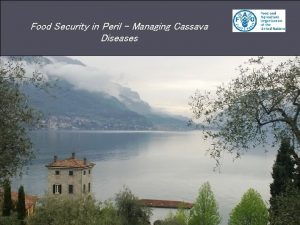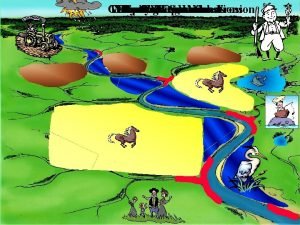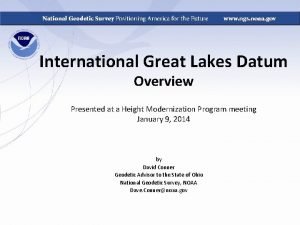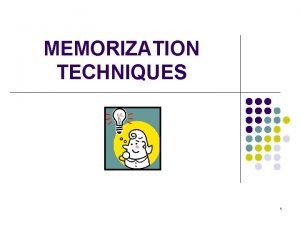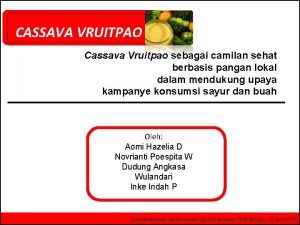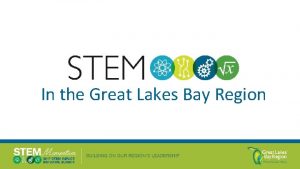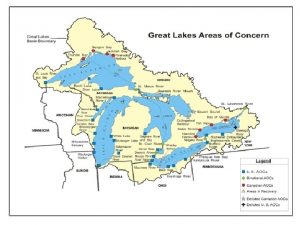CRS harnessing ICT in the Great Lakes Cassava












- Slides: 12

CRS harnessing ICT in the Great Lakes Cassava Initiative (GLCI) Project and Beyond Catholic Relief Services, East and Central Africa Regions Shaun Ferris- Senior Technical Advisor for Agriculture Jonathan Schofield- Deputy Director and Training Objective Leader, GLCI With support from: Michael Matarasso-GLCI M&E Specialist and Peter Mureithi, GLCI ICT Officer 29 th March 2011 Lusaka, Zambia

Focus on GLCI: Project Background • Funded by the Bill & Melinda Gates Foundation • Aims to provide disease tolerant cassava planting material to 1. 15 million farming households • 58 partners six countries (IITA, NARS, local partners) • 250 partner staff and 250 rugged mini-laptops

Value Proposition / Product • Computer based training (on and off line) for consistent messaging and to reduce costs and cascading of training • Computer based M&E enabled real time data collection and reporting, increased efficiency in data collection, reporting and reduced data errors • Use of Team Viewer program for basic remote trouble shooting • Project website for making project information available • Use of SMS to communicate broadly at scale

Key Differentiators USER Value of ICT in GLCI Donor • Accurate reporting • Accountability • Increased efficiency &impacts CRS • Accountability • Efficiency and impacts • Improved service to partners • Timely acquisition and exploitation of information Partners • Accountability • Can adjust and improve activities • Improved quality of data • Increased efficiency in data entry • Quality farmer learning sessions for increasing behavior change Participant Increased impacts through better learning and activities beneficiaries

Cost Saving • Reduced need for face to face training and refresher trainings • Reduced use of paper and data entry (in theory, but not yet in reality) • Affordable communication at scale

New Clients • Equip with hardware and software • Train/ orient • Enroll • Monitor • Backstop/ troubleshoot

Progress to date: 1. >50% partner staff taking GLCI Go. Course curriculum and empowered with knowledge, confidence and reference materials and facilitating consistent farmer learning, 2. All partners are capturing field level data directly (and indirectly) into mini-laptops, periodically uploading this information to the database, and this data is being verified via audits, 3. The project website is functional with access to reports and records 4. SMS messages are being used to inform field staff of new developments and deadlines.

Challenges 1. Startup costs are very high, 2. Working with a large number of first time computer users, 3. Limited enabling infrastructure (i. e. intranet, power and local technical support), 4. Non-reading culture amongst extension staff, 5. Weak history of partner documentation of project information, 6. Technical challenges with hardware and software (viruses, compatibility, operating system failure, etc), 7. Scale and diverse operating environment of the project, 8. High turnover of CRS and partner staff

Key lessons learned 1. Improve courses w/ more audio-visual 2. Move courses to open source software, 3. Develop and implement training and M&E systems at the onset of projects, 4. M&E systems must be useful to partners in improving project implementation as well as in demonstrating success to the donor, 5. Ensure that the technology is fully functional before rollout to avoid user frustration and inefficient use of resources,

Key lessons learned 6. First time computer users, assisted with considerable up front training, guidance and follow-up can become successful, 7. However, alternative solutions / pathways must be availed as not all participating partner staff can use the technology solutions, 8. ‘Team viewer’ software is a powerful tool for remote troubleshooting of technical issues with computers, 9. SMS can facilitate consistent and broad communication, but could be enhanced by increasing two way flow of information, 10. Technology is evolving rapidly so we must be open to emerging superior solutions- presently use of smart phones may be a more field and user friendly option.

Sustainability 1. Agilix Go. Course is not open source 2. M&E system can not be maintained or replicated at partner level, however they do have increased appreciation and capacity 3. Partner staff already make full use of SMS and will continue to do so.

Thank You!
